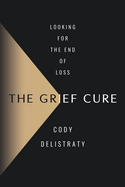
Journalist Cody Delistraty's first book, The Grief Cure, is an earnest personal inquiry into how medicine and technology could be used to treat complex grief.
In 2022, "prolonged grief disorder" (PGD) was added to the American Psychiatric Association's Diagnostic and Statistical Manual of Mental Disorders. Notwithstanding uneasiness over the pathologization of grief, Delistraty discovers that he is among the percentage of grieving people--as high as 20%--for whom this diagnosis of debilitating grief that severely affects daily life more than a year following a bereavement may be appropriate. Indeed, seven years after his mother's death from melanoma, he was still reliving traumatic moments from her illness and regretting he didn't get to know her as well as he felt he should have.
Delistraty travels far and wide, meeting with experts and exploring strategies that might help. Studies have aimed to treat PGD with naltrexone (which is prescribed for alcohol and opioid dependence); antidepressants, hormones, and hallucinogens are also under consideration. But not all proposed cures are pharmaceutical. After learning about the physical benefits of laughter therapy, Delistraty finds himself in the absurd position of forcing out-loud laughs in a Paris metro car. He ponders funerals and other mourning rituals but also widens the scope of loss by attending a "breakup bootcamp" in Northern California.
Two of the most extreme, intriguing methods Delistraty discusses are memory deletion, being researched by Karl Deisseroth at Stanford University, and communicating with the dead through AI chat bots trained on their speech patterns. Despite the serious subject matter, there is much levity and a spirit of curiosity here. --Rebecca Foster, freelance reviewer, proofreader and blogger at Bookish Beck

